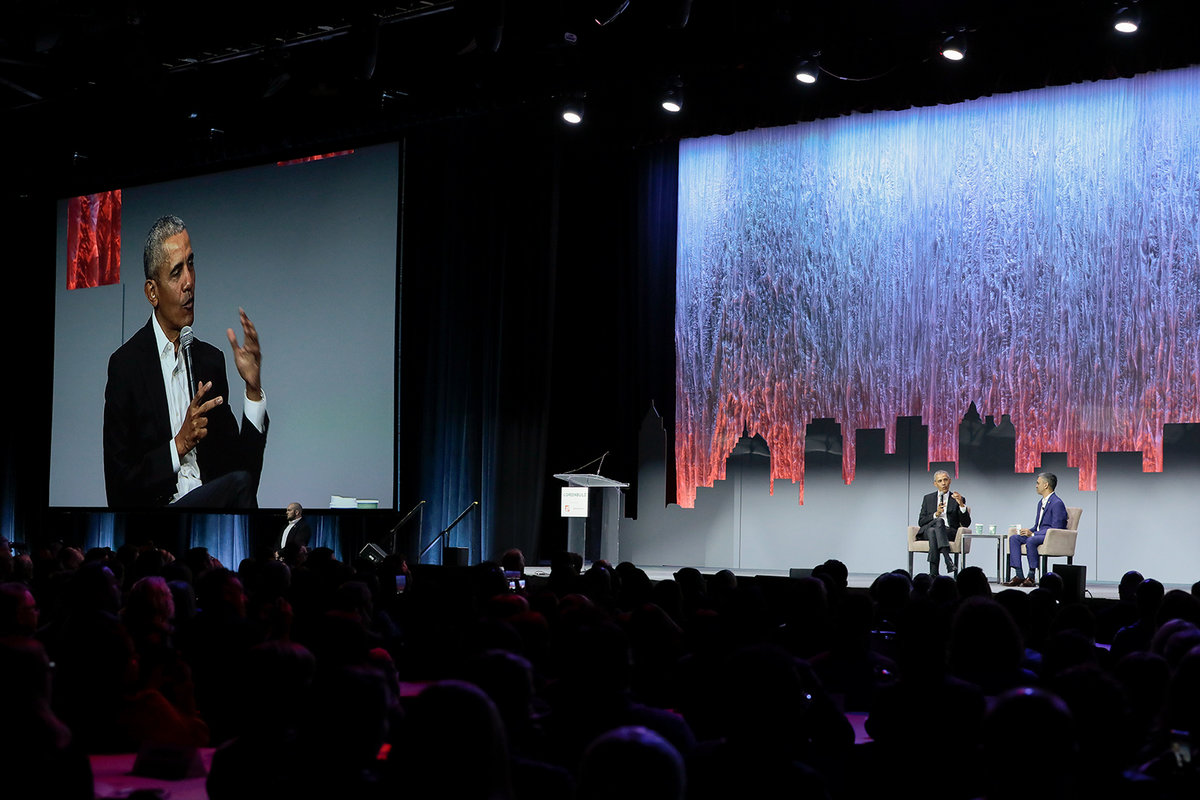
Photograph by Oscar & Associates
Sitting cross-legged, sans tie, and flanked by a few biodegradable cups of coffee, former President Barack Obama seemed relaxed on stage in downtown Atlanta Wednesday morning. At the Georgia World Congress Center, the 44th commander-in-chief waxed eloquent on efforts in America and abroad to address mankind’s mounting environmental crises—namely, climate change. And—as Gordon Sondland, the U.S. Ambassador to the European Union, testified before members of Congress as part of a presidential impeachment inquiry—Obama took subtle jabs at his successor, Donald Trump.
During the Greenbuild Expo, an international conference spotlighting the merits of environmentally sustainable construction, Obama, Wednesday’s keynote speaker, quipped that he “had the luxury as president to not have jerks around,” and said he’s proud that “we had really smart people working for us.” And, of course, in keeping with the theme of Greenbuild, which the former president was asked to speak at thanks in part to his administration’s work with the Paris Climate Accords, he called attention to the indisputable evidence fingering human behavior as a main propeller of climate change, as well as the urgent need to ratchet up the way we purposefully live, work, and design cities. “I’m all about logic and reason and fact,” Obama said, adding, “Obviously, that’s contested these days.”
Unlike enacting bad tax policies for four or eight years, letting climate change and related environmental problems run rampant can be permanently detrimental to a society, Obama said. “You can be too late,” he said of climate change. “It becomes irreversible.” Reining in environmental crises, however, is an arduous task nowadays, thanks in part to “huge gaps in wealth and opportunity and education,” he added.
That notion carries extra weight in Atlanta, which has repeatedly earned the dubious title of income inequality capital of America. Additionally, green building—essentially, environmentally conscious and resource-efficient construction—is sometimes incompatible with affordable housing, which relies on public subsidies and cutting costs.

Photograph by Oscar & Associates
Obama also wishes that investors and architects would take more stock of what stakeholders want before redeveloping neighborhoods. It’s important to hear their stories, he said. “Stories around ‘place’ are a good way to start conversations about sustainability,” Obama said.
Granted, the former president admitted he doesn’t have the formula for the “right size,” but when he’s invited to a hotel’s so-called “presidential suite,” he said it can be taxing to keep track of which lights in which rooms he needs to turn off before bed. Perhaps America could take a page from Japan’s playbook, Obama said, alluding to the seemingly ubiquitous motion-sensing lights installed overseas. “It’s a bit spooky sometimes,” he said of the automatic lights.
Spookier, though, are the looming effects of climate change, the brunt of which is sure to be felt by generations following Obama’s. He praised Swedish climate activist Greta Thunberg for her “global movement” against fossil fuel interests. “She does not understand how adults can’t take this [environmental crisis] seriously,” he said. The 16-year-old’s organization of school strikes, among other advocacy efforts, “bring attention to the problems in a way that no U.N. paper, no New York Times story can,” Obama said.
Yet that activism—albeit immeasurably important, Obama said—is all for naught if it doesn’t translate into measurable political action. And sometimes, that action doesn’t take all that much effort. Said Obama: “The biggest way to have influence is by voting.”










![The North Carolina Museum of Natural Sciences’ newest exhibit is a [pre]historic first](https://cdn2.atlantamagazine.com/wp-content/uploads/sites/4/2024/04/DD-3-100x70.jpg)



